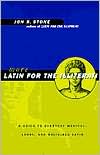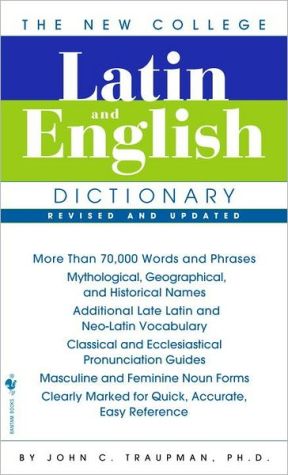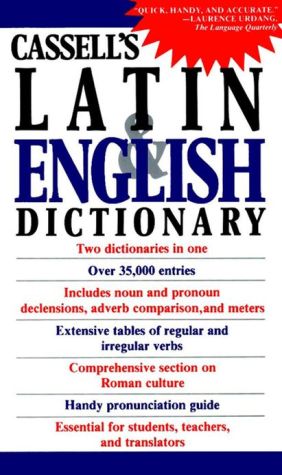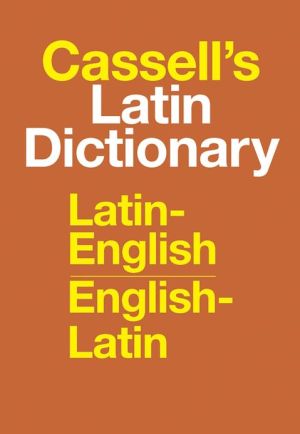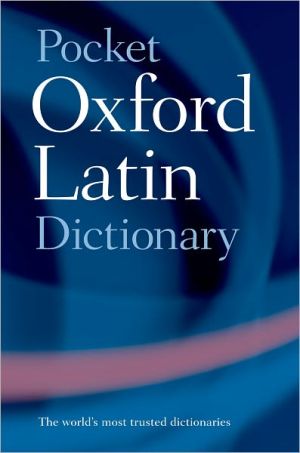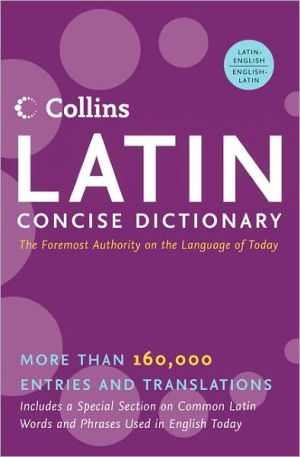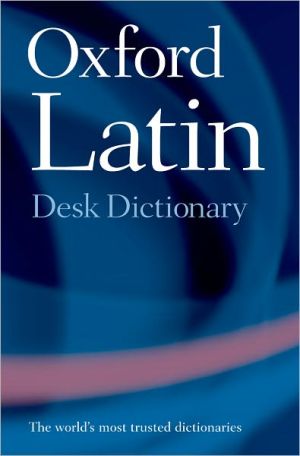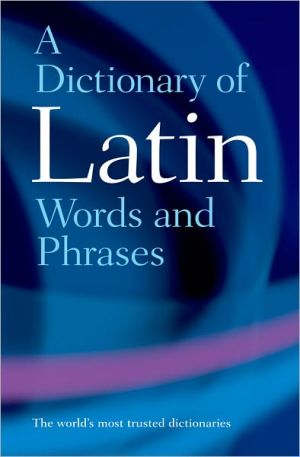More Latin for the Illiterati; A Guide to Everyday Medical, Legal and Religious Latin
Scientia est potentia (knowledge is power)! More Latin for the Illiterati demystifies the terminology of modern courtrooms and hospitals, untangles some of the most complex and unforgiving examples of Latin abbreviation, and allows readers to explore the classical roots of law, medicine and the ministry.\ \ This new collection contains nearly 5000 entries devoted to law, medicine and religion, and includes phrases like:jus sibi dicere— to take the law into one's own hands\ hircosus— smelling...
Search in google:
Scientia est potentia (knowledge is power)! More Latin for the Illiterati demystifies the terminology of modern courtrooms and hospitals, untangles some of the most complex and unforgiving examples of Latin abbreviation, and allows readers to explore the classical roots of law, medicine and the ministry.This new collection contains nearly 5000 entries devoted to law, medicine and religion, and includes phrases like:jus sibi dicere— to take the law into one's own handshircosus— smelling like a goatopprobrium medicum [the reproach of physicians]—an incurable diseaseita et viri debent diligere uxores ut corpora sua—so men ought to love their wives as their own bodies [Ephesians 5:28]ludere cum sacris—to trifle with sacred thingsamicus curiae—a friend of the courtPracticing or aspiring doctors, lawyers or ministers, language-lovers, students of literature—and anybody who loved Latin for the Illiterati, will want More... This collection also makes an ideal gift.Praise for the first Illiterati collection:"If you're a student trying to improve your vocabulary, this is a great book... For those who have forgotten their three years of parochial-school Latin, this is really great book." —Publisher's Weekly"A ready-reference dream come true..."—American LibrariesAlso of interest: Latin for the Illiterati: Exorcizing the Ghosts of a Dead Library Journal Stone follows up his Latin for the Illiterati (LJ 12/96) with this new dictionary, structured around the subtitle's three areas: medicine, law, and religion. Translations are brief and literal. The dictionary concludes with some of the same information given in Latin for the Illiterati as well as newer miscellaneous information, including Latin selections (with English translations) from the Roman Catholic liturgy. The dictionary ends with an English-Latin index. The major drawback is the arrangement by topic--the three different topic areas must be checked if the user doesn't know whether the word or phrase is medical, legal, or religious (there is no Latin index). On the positive side, this dictionary contains many terms not found in other recent Latin-English dictionaries, such as James Morwood's A Dictionary of Latin Words and Phrases (Oxford Univ., 1998). Adeleye's World Dictionary of Foreign Expressions provides translations from over 20 languages, making it an excellent resource for general users. Each definition indicates part of speech, language of origin, plural forms, and literal translation (including the literal translation of each word in a phrase). Also included are lengthier, connotative definitions, examples of use in sentences, and, when appropriate, cross references to other terms. Adeleye's dictionary is recommended for all public and academic libraries; Stone's is for libraries needing a more specialized resource.--Cynthia A. Johnson, Barnard Coll. Lib., New York Copyright 1999 Cahners Business Information.
\ Library JournalStone follows up his Latin for the Illiterati (LJ 12/96) with this new dictionary, structured around the subtitle's three areas: medicine, law, and religion. Translations are brief and literal. The dictionary concludes with some of the same information given in Latin for the Illiterati as well as newer miscellaneous information, including Latin selections (with English translations) from the Roman Catholic liturgy. The dictionary ends with an English-Latin index. The major drawback is the arrangement by topic--the three different topic areas must be checked if the user doesn't know whether the word or phrase is medical, legal, or religious (there is no Latin index). On the positive side, this dictionary contains many terms not found in other recent Latin-English dictionaries, such as James Morwood's A Dictionary of Latin Words and Phrases (Oxford Univ., 1998). Adeleye's World Dictionary of Foreign Expressions provides translations from over 20 languages, making it an excellent resource for general users. Each definition indicates part of speech, language of origin, plural forms, and literal translation (including the literal translation of each word in a phrase). Also included are lengthier, connotative definitions, examples of use in sentences, and, when appropriate, cross references to other terms. Adeleye's dictionary is recommended for all public and academic libraries; Stone's is for libraries needing a more specialized resource.--Cynthia A. Johnson, Barnard Coll. Lib., New York Copyright 1999 Cahners Business Information.\ \ \ \ \ BooknewsA principio (from the beginning) this codex (book) is ad captum vulgi (easily understood). Stone's (interdisciplinary studies, UC Berkeley) companion piece to is a guide for the average person interested in understanding the origin of many terms we commonly use each day with a focus on three areas of most common usage: legal, medical, and religious. Organized into three sections, Latin entries are arranged alphabetically; and the book includes an English to Latin index and an index of Latin abbreviations. Annotation c. Book News, Inc., Portland, OR (booknews.com)\ \
